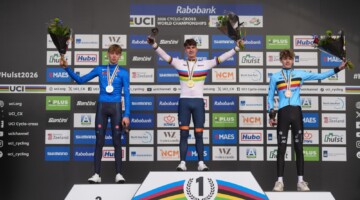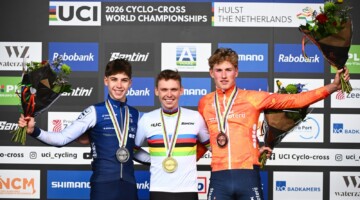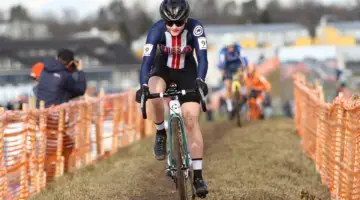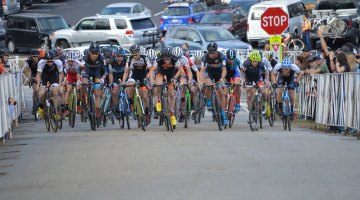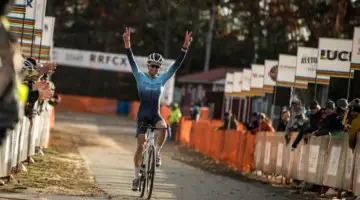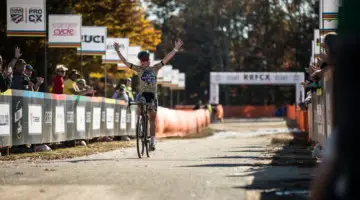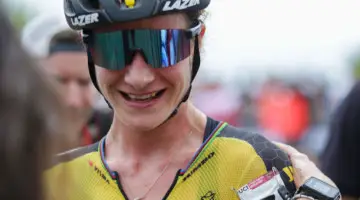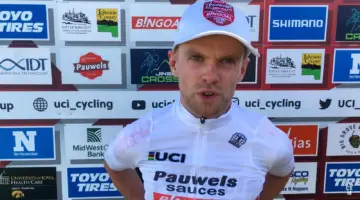When the news broke about the cancellation of Interbike right before Nationals, our first thought was about the future of the one cyclocross-specific component of the week, RenoCross.
Cyclocross Magazine’s Andrew Yee caught up with RenoCross promoter Coby Rowe just hours after the announcement to find out what might become of the storied race that began as CrossVegas and then became RenoCross for its first installment in September of this year.
Today we bring you our conversation with Rowe that covered the future of the event, his reaction to the convention being canceled and his thoughts on the UCI’s plans to enforce strict qualifications criteria for UCI C1 races.
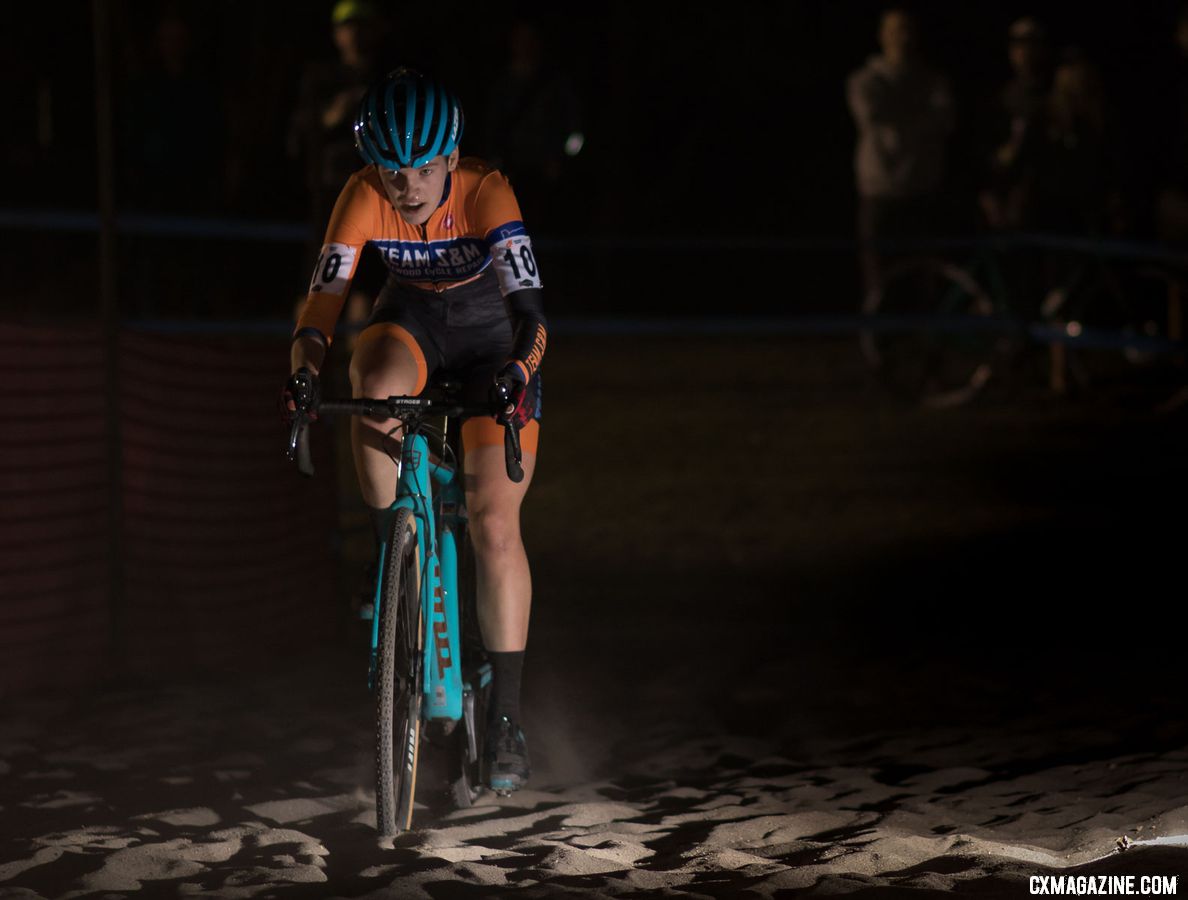
Will RenoCross return in 2019? We spoke with race director Coby Rowe to find out.. 2018 Reno Cross women’s race. © A. Yee / Cyclocross Magazine
Interview: Coby Rowe on the Future of RenoCross
CXM: So obviously there was some surprising news last night about Interbike being canceled. That surprised me, but did you have any heads up on that?
Coby Rowe: I did not, and in fact, I have talked with our convention and visitors authority the day before and never got any impression that there was anything other than Interbike would be happening in 2019.
CXM: Wow. CrossVegas and then RenoCross have obviously been attached to Interbike. Now with this news, what are the chances of you having an event in Reno next year?
CR: You know, right now, I’m going to say that the intent is to have an event in Reno next year. We, the RenoCross group, need to sit down and look at our options. Obviously, promoting the race during the Interbike trade show has a lot of advantages that allow you to make a great event. The reason we put these races on is we love cyclocross and we know that the athletes are really what make a great event.
So, since we’re still eligible for C1, we have submitted the paperwork already, so we’re gonna see what’s on the table and what we can accomplish. And I think, as far as the West Coast goes, it would be great to keep a C1 on the West Coast.
CXM: For sure. Without being attached to Interbike, does that open up flexibility in terms of scheduling?
CR: It does. Our first thought is obviously trying to run a Wednesday night race or a Thursday race doesn’t make much sense without the trade show, so we’d be looking at a single or a multi-day format on a weekend.
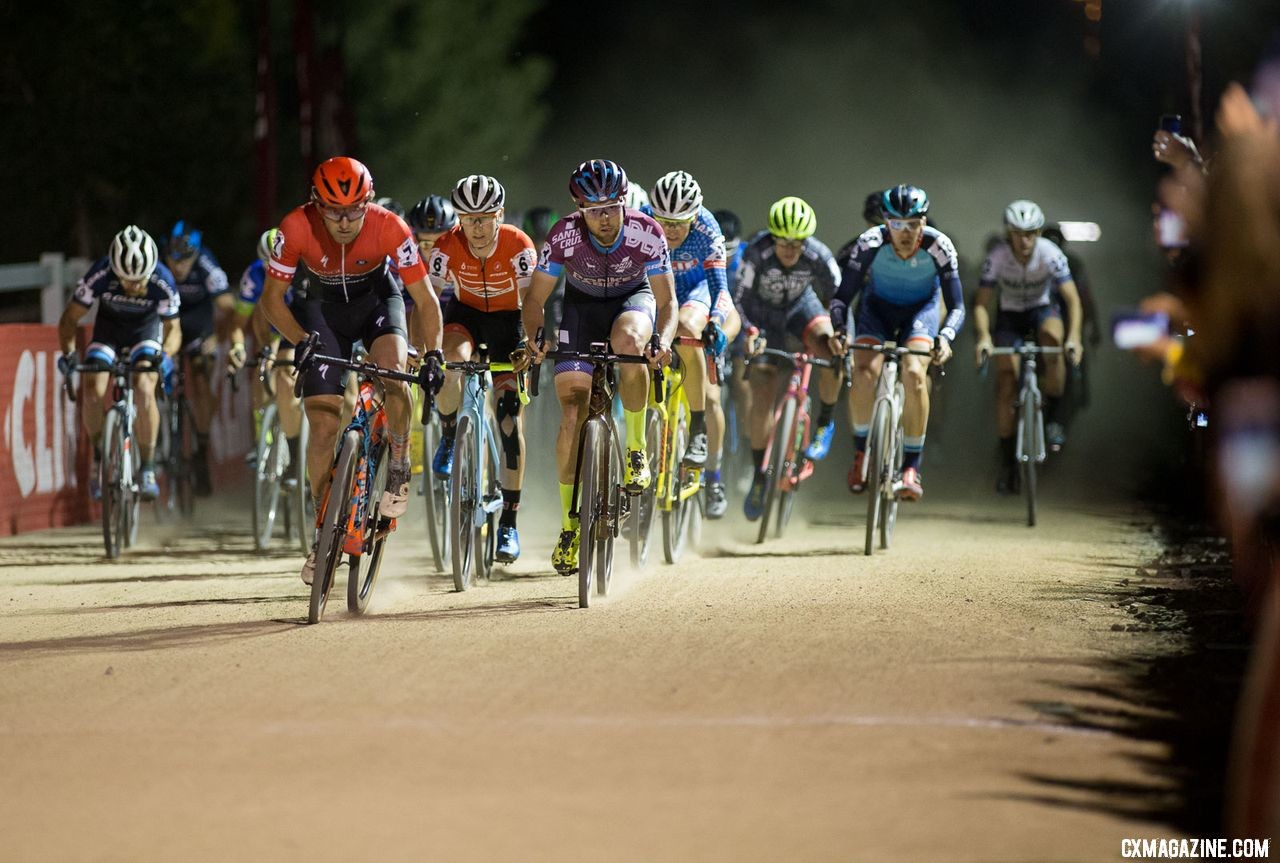
RenoCross was a night race this year but could move to the weekend in the future. 2018 RenoCross men’s race. © J. Silva / Cyclocross Magazine
CXM: Got it. I imagine you are one of the few events that might qualify for C1 if UCI is strict about their C1 criteria next season. I’m not sure if you saw our article on the UCI’s plan, but it seems very restrictive next year for the US to have any C1s. Have you gone through your list of riders and countries represented to ensure that you do have C1 status for next year if you have another event?
CR: We did. We evaluated the people that raced in the UCI race last year, and we made the cut, barely. And it was barely. And obviously not having Interbike will also create challenges. There were some brands who brought their athletes here to race at our race, solely because of the Interbike trade show, so that would present us with another challenge.
CXM: Got it. With Nationals being in Seattle next year, and the West Coast having a limited selection of UCI events, do you have any thoughts of perhaps teaming up with West Sac GP or doing events pre-Nationals so people can hang out on the West Coast for a while?
CR: You know, it’s a good idea. I know the West Sac promoter, I like those guys a lot and I like their race. Right now, anything is on the table. We haven’t really put anything on the drawing board yet.
CXM: You mentioned the promoters’ meeting at Nationals, but in terms of actually pitching for a date and teaming up with other promoters in your area, when do those decisions need to happen?
CR: For an event like RenoCross or the West Sac GP, I think it needs to happen soon. I know in Northern California, there’s a great cohesive effort among the promoters in Northern California to align schedules so that each other can not conflict with race weekends
CXM: Right.
CR: And that usually happens in the Spring, but I think for the UCI category races, it needs to happen sooner.
CXM: Yeah, but usually around World Championships time, the UCI has a preliminary schedule, so obviously this news just dropped in your lap but is it now a mad scramble to still meet the UCI’s deadline even though you’re kind of thrown for a loop now?
CR: So we’ve submitted the paperwork to the UCI for our event for next year. Obviously we are going to have to amend the date, and depending on what we decide to do, we’ve also submitted to USA Cycling to remain on the Pro CX calendar.
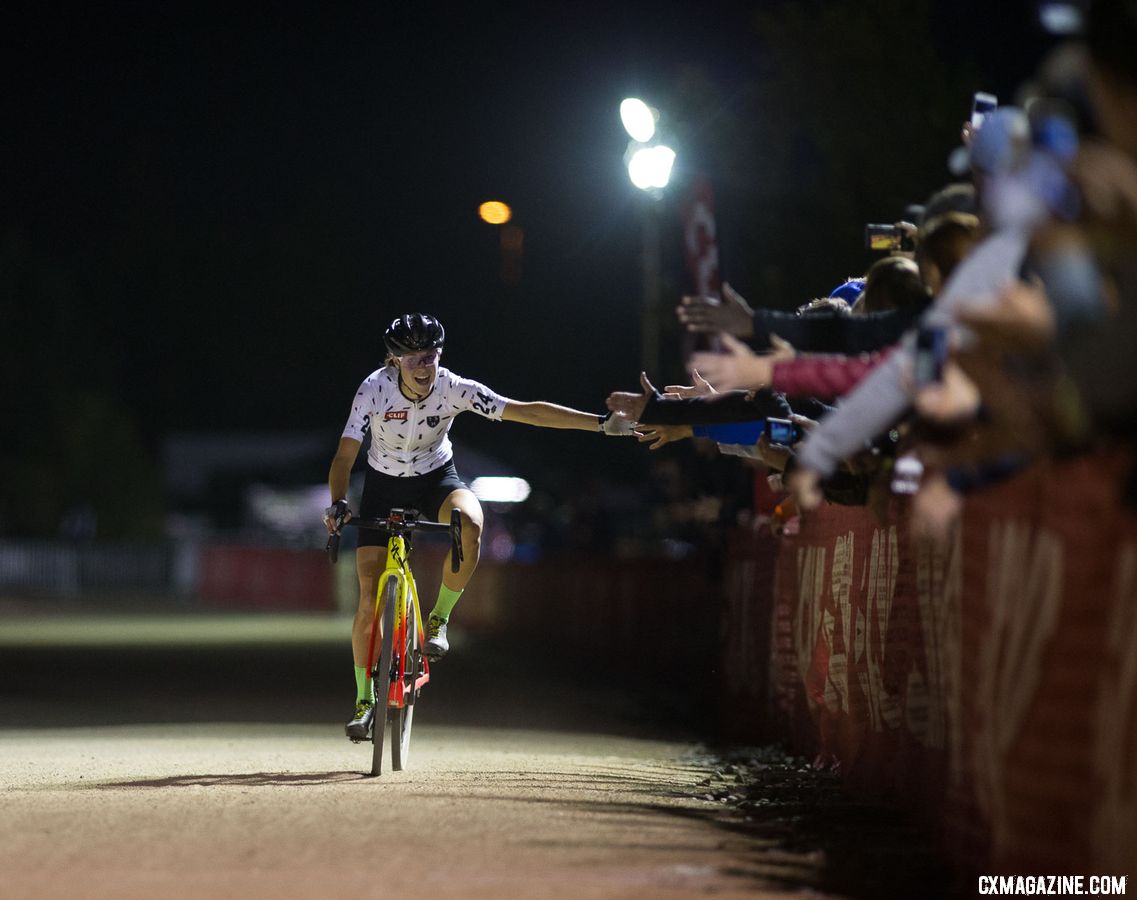
RenoCross organizers submitted paperwork to hold the event again in 2019. 2018 RenoCross women’s race. © J. Silva / Cyclocross Magazine
CXM: Got it.
CR: So I do know, I believe at least with USA Cycling and the people involved there that I really feel like they’ll work with us. I know they see the value in these events. But until we ultimately decide what we want to do, we don’t know.
CXM: Yeah. Stepping back from your race, what are your thoughts on the cancellation of Interbike?
CR: So, my personal perception during RenoCross last year, talking to attendees and if they were exhibitors or retail buyers, is that they thought Reno was positive for the trade show. I believe there were 17,000 people in town, and when we had a chance to interact with people, either at the trade show or at RenoCross, they enjoyed Reno and I think they enjoyed that the show was a little more intimate. I think that Reno did a great job, so I’m surprised that they’ve canceled for next year.
CXM: With your event being tied to Interbike, I imagine that made it easier to draw sponsors both in terms of money and presence at the event. Do you see that as perhaps the biggest challenge of continuing without the show?
CR: Yeah, you know Interbike brings some advantages. You have sponsors that want to come to town, you have brands that want to entertain the customers at your event, you have a larger volume of attendees that will come to the race to have a good time and relax because they’re not at the trade show.
CXM: Right. Was last year profitable, if you don’t mind sharing?
CR: We ended up in the black.
CXM: Oh, good.
CR: With all events, you take that first year to really get a look at everything and you try to minimize your expenses. You start to look forward to the next year so that you can adjust and add to the event to make it more spectacular and at the same time make sure that you’re covering all your bases to remain in the black.
CXM: In order to make the event happen without Interbike, would going down to C2 be one of the decisions and one of the cost savers?
CR: Adjusting to a C2 would. You know, when we look at our options and what you’re alluding to with having Nationals in Seattle next year, the decrease in prize money and what we would spend, would we be better off and would we get more racers by staying at C1? And then we have to approach riders to come race, and say, “Hey do you want to come out to Reno to race?” Just to try to remain a C1 the following year. There’s a lot that goes into being a C2. It’s still good for the riders in our area. I think the West Coast needs to keep UCI events on the calendar.
CXM: For sure. So it sounds like, even though this news has just dropped, you’re gonna be making a bunch of phone calls to promoters and USA Cycling and potential sponsors?
CR: Correct. There are a lot of things to work out, I mean I found out less than 24 hours ago. Between the convention and visitors’ authority and USA Cycling and our sponsors from last year, the people that we were already working with for next year, there’s a lot to straighten out.
CXM: Do you have sponsors from last year’s event that have already committed to next year’s?
CR: We don’t have anyone signed on paper, but we made sure that we talked to everyone and made sure that we were delivering on what we promised and that they were enjoying the race and felt like they were getting a return. Our feedback from the sponsors was positive, and everyone had expressed interest in coming back in 2019. That’s a much different picture now, so we have new challenges ahead of us as far as sponsorship goes.
CXM: I guess if you’re not attached to a Wednesday night event, that opens up terrain because there won’t be any lighting constraints? Is that a glass half full way of looking at it?
CR: That’s right. You know if we go to a daytime event it could open up that nasty hillside that everybody loves so much.
CXM: Yeah, and the Nationals course, the terrain?
CR: Yep, there were a lot of people actually wanting to ride that during RenoCross and you know, it had challenges at night but during the daytime that challenge goes away.
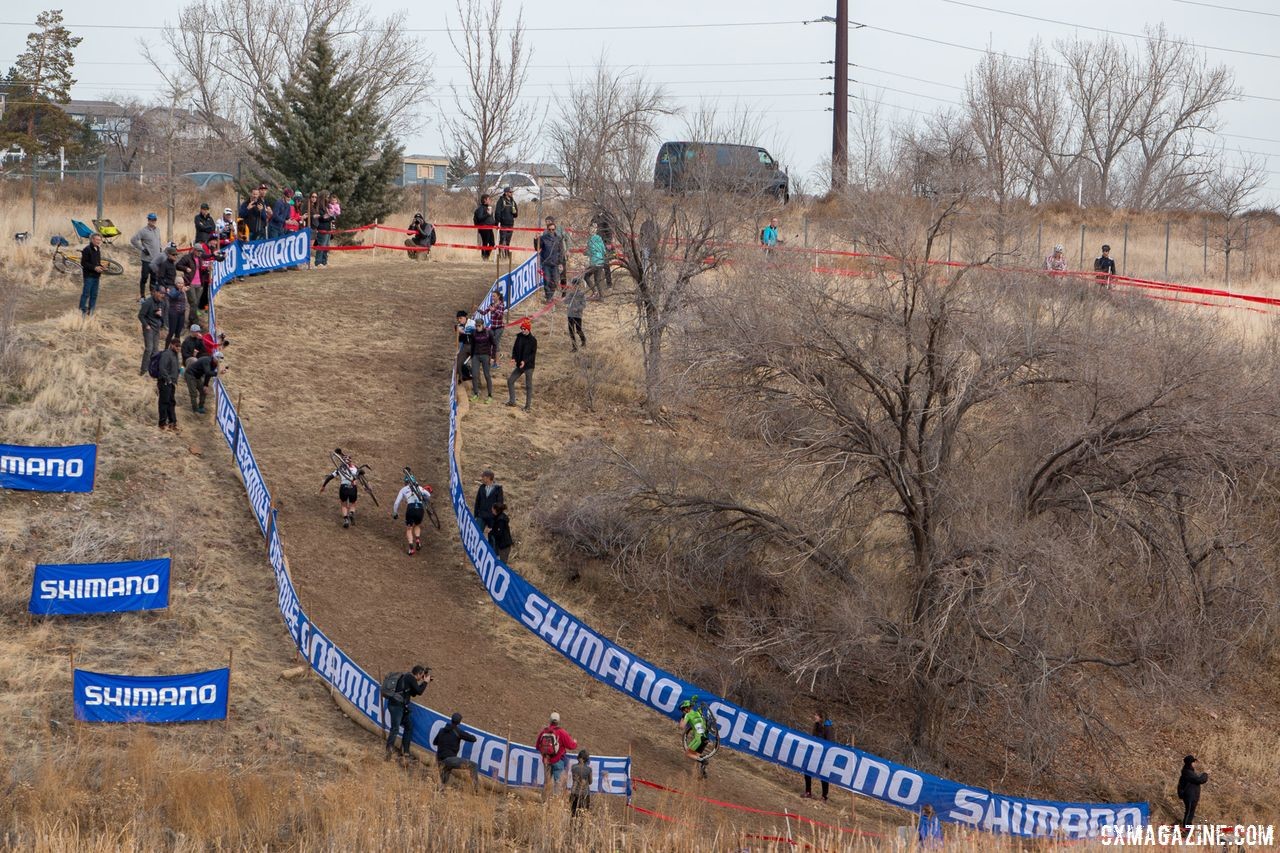
A day race would give organizers the option of using the hillside again. 2018 Cyclocross National Championships. © A. Yee / Cyclocross Magazine
CXM: Right. If riders or readers want to help ensure the future of RenoCross what can they do?
CR: Right now if we decide to stay at C1 and do a multi-day race, having the interest from those riders and knowing that they’d be willing to come race the event would be helpful to us. Having a great turn out in athletes ultimately helps with the sponsorship, and helps with everything.
CXM: Sure, and with this development with the UCI and their potential cracking down on C1 requirements, we’re not Belgium, we don’t pay big start money for riders, but do you see that as a scenario where you would be dangling travel expenses or start money to get certain international riders to meet the quotas?
CR: We’ve never done it, although we’re only one year into this, and I would hope that we wouldn’t need to. I think that the UCI, when you look at that rule, a lot of the countries in Europe fit in some of our larger states. You know, multiple countries.
CXM: Yeah, for sure.
CR: Traveling around to events in Europe is much different than it is here. So I get their rule, I get why it works. I think in America it would be nice if it had a little more leeway.
CXM: We’ve reached out to the UCI too, and they said they’re gonna do more homework before having an official statement as to next year’s C1 status in the US. So, I guess they’re not a hundred percent set on really cracking down on the rules.
CR: You know as a promoter, and any of the C1 promoters, it’s a tough rule.
CXM: Yeah, for sure. So, at least one upside is that you are very close to Katerina Nash, right?
CR: Right, I’ve got Katerina, we’ve got Sofia [Gomez Villafane], you know, we’ve got some great international riders that love to call this part of the country home.
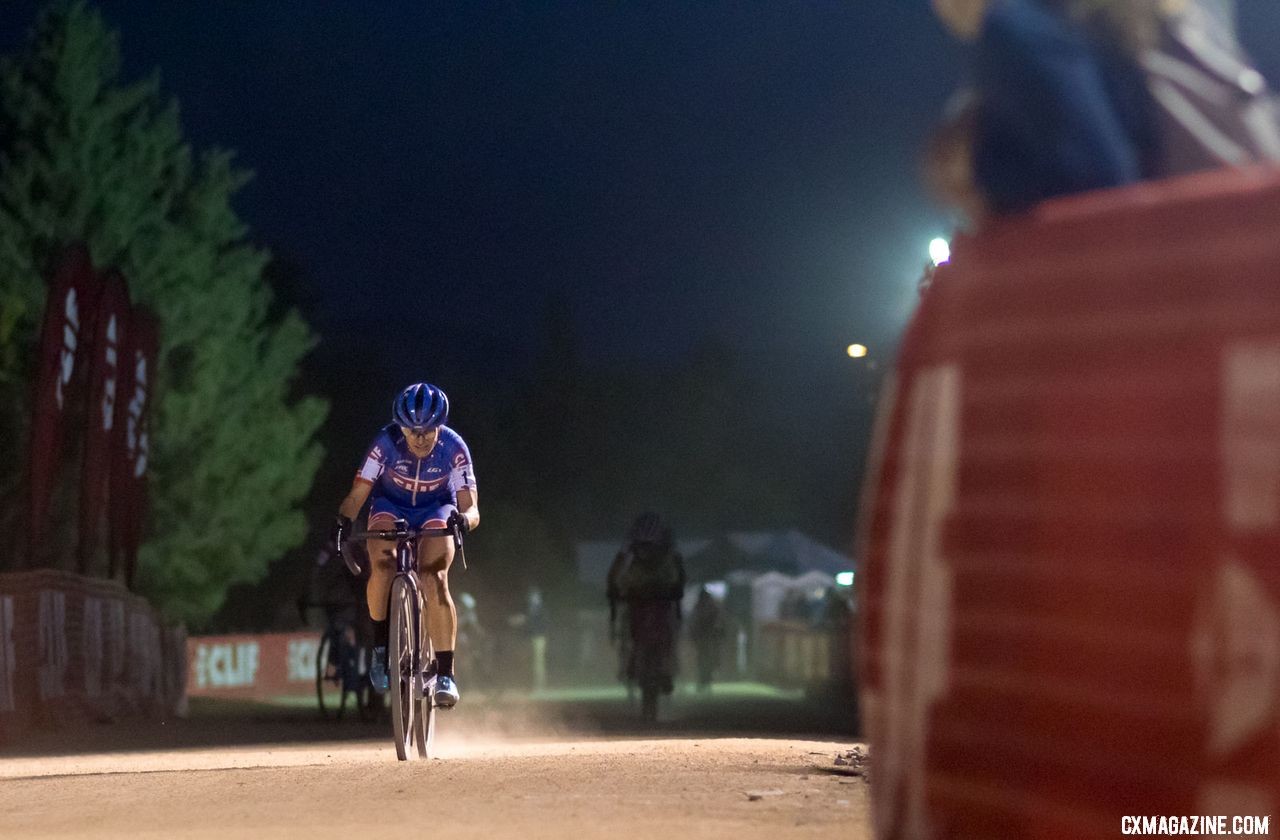
Katerina Nash is one international athlete who would likely help RenoCross in the future. 2018 Reno Cross women’s race. © A. Yee / Cyclocross Magazine
CXM: Well, best of luck in figuring out 2019, and we hope to be there.
CR: Thank you!



